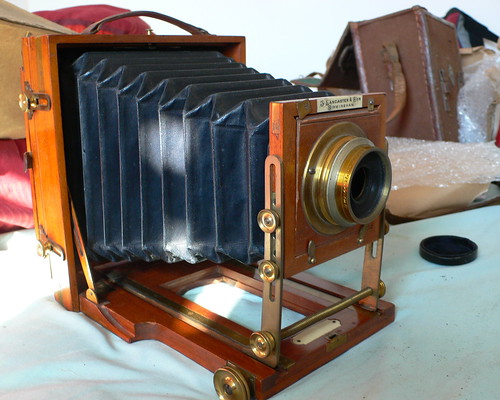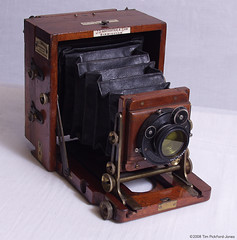Difference between revisions of "Lancaster"
m (→Cameras) |
|||
| Line 9: | Line 9: | ||
}} | }} | ||
</div> | </div> | ||
| − | '''J. Lancaster & Son''' was a renowned optician and camera maker based in Birmingham. | + | '''J. Lancaster & Son''' was a renowned optician and camera maker based in Birmingham, founded in 1835 as optical company. It got a patent on an achromatic [[meniscus lens]] in a brass tube which was focusable by means of a lever. After 1871, when William James hat joined the company, it started making wooden view cameras, among them several cameras for smaller plate formats. The [[Lancaster Gem Apparatus]] of 1880, with 12 lenses to make 12 small exposures on a big plate, may have been the company's first exciting novelty. The company produced cameras named '''[[Instantograph]]''' for many years, during which the design of the camera developed somewhat. It is usually a quarter-plate camera. ''Early Photography'' describes the different Instantograph models, shows several examples, and gives some guidance on dating the cameras.<ref name=EPInstRest>[http://www.earlyphotography.co.uk/site/entry_C5.html Instantograph and BB Instantograph cameras] from 1888, 1891, 1893 and 1903, with a list of other Instantograph models, and notes on developments in the standard model over time, at [http://www.earlyphotography.co.uk/index.html Early Photography].</ref><ref name=EPInstOrig>[http://www.earlyphotography.co.uk/site/entry_C417.html Instantograph, original model, 1882] at ''Early Photography''.</ref><ref name=EPInst1887>[http://www.earlyphotography.co.uk/site/entry_C494.html 1887 Instantograph] at ''Early Photography''.</ref> The ordinary Instantograph was later renamed the '''BB Instantograph''' (for brass-bound), the most extraordinary was named '''Empire Instantograph'''. |
| + | |||
Lancaster made some stereo folding cameras, and some detective cameras, the '''[[Lancaster Rover|Rover]]''' and '''Perfect Omnigraph'''. | Lancaster made some stereo folding cameras, and some detective cameras, the '''[[Lancaster Rover|Rover]]''' and '''Perfect Omnigraph'''. | ||
| − | + | The unusual cameras included the '''Gem Apparatus''' of 1880, a camera with twelve lenses, for making 'gem' portraits on ferrotype plates, and the '''Patent Watch Camera''', a tiny plate camera (in two sizes, for gentlemen and ladies) telescoping out of a pocket watch case. Lancaster made its own lenses and had patents on several shutter mechanisms. Other products included magic lanterns. | |
| − | |||
| + | In 1898 Lancaster produced 200.000 cameras, thus having been the largest camera maker in the World. With the decline of plate photography since 1910 the business of Lancaster declined too, until it was ceased in 1955. | ||
{{Flickr_image | {{Flickr_image | ||
| Line 54: | Line 55: | ||
* 1891: Stereo Instantograph / [http://www.antiquewoodcameras.com/str-inst.html] at www.antiquewoodcameras.com | * 1891: Stereo Instantograph / [http://www.antiquewoodcameras.com/str-inst.html] at www.antiquewoodcameras.com | ||
* ....: Stereo Meritoire | * ....: Stereo Meritoire | ||
| + | * ....: [[The International]] | ||
* 1890: [[Lancaster Rover|Rover]] magazine detective camera / [http://www.photographica.nu/lanca244.htm] at www.photographica.nu | * 1890: [[Lancaster Rover|Rover]] magazine detective camera / [http://www.photographica.nu/lanca244.htm] at www.photographica.nu | ||
* 1893: Perfect Omnigraph detective camera | * 1893: Perfect Omnigraph detective camera | ||
Revision as of 06:12, 13 July 2015

|
| A Lancaster camera, probably a BB Instantograph.[1] image by Justin Cormack (Image rights) |
J. Lancaster & Son was a renowned optician and camera maker based in Birmingham, founded in 1835 as optical company. It got a patent on an achromatic meniscus lens in a brass tube which was focusable by means of a lever. After 1871, when William James hat joined the company, it started making wooden view cameras, among them several cameras for smaller plate formats. The Lancaster Gem Apparatus of 1880, with 12 lenses to make 12 small exposures on a big plate, may have been the company's first exciting novelty. The company produced cameras named Instantograph for many years, during which the design of the camera developed somewhat. It is usually a quarter-plate camera. Early Photography describes the different Instantograph models, shows several examples, and gives some guidance on dating the cameras.[1][2][3] The ordinary Instantograph was later renamed the BB Instantograph (for brass-bound), the most extraordinary was named Empire Instantograph.
Lancaster made some stereo folding cameras, and some detective cameras, the Rover and Perfect Omnigraph. The unusual cameras included the Gem Apparatus of 1880, a camera with twelve lenses, for making 'gem' portraits on ferrotype plates, and the Patent Watch Camera, a tiny plate camera (in two sizes, for gentlemen and ladies) telescoping out of a pocket watch case. Lancaster made its own lenses and had patents on several shutter mechanisms. Other products included magic lanterns.
In 1898 Lancaster produced 200.000 cameras, thus having been the largest camera maker in the World. With the decline of plate photography since 1910 the business of Lancaster declined too, until it was ceased in 1955.

|
| Lancaster's Patent See Saw Shutter - here fitted to the "Rover" detective camera 1891 image by Geoff Harrisson (Image rights) |

|
| Le Meritoire image by Coleccionando Cámaras (Image rights) |
Cameras

|
| image by Tim Jones (Image rights) |
- 1880: Gem Apparatus
- 1882: Instantograph / [1] at www.photographica.nu
- 1882: Le "Meritoire" / [2] at www.photographica.nu
- 1882: Le "Merveilleux" / [3] at www.photographica.nu , and [4] at www.antiquewoodcameras.com
- 1886: Watch camera / [5] at www.eastman.org
- 1890: Stereo Merveilleux / [6] at www.photographica.nu
- 1891: Stereo Instantograph / [7] at www.antiquewoodcameras.com
- ....: Stereo Meritoire
- ....: The International
- 1890: Rover magazine detective camera / [8] at www.photographica.nu
- 1893: Perfect Omnigraph detective camera
- 1900: The Kamret / [9] at www.photographica.nu
Shutters
- Lancaster's See Saw Shutter
- Lancaster's patent rotary shutter / [10] at www.photographica.nu
- Lancaster's patented bean shutter / see above (Link to Le "Merveilleux" at www.photographica.nu)
Notes
| British companies | ||
| Adams & Co. | Agilux | Aldis | APeM | Aptus | Artima | Barnet Ensign | Beard | Beck | Benetfink | Billcliff | Boots | British Ferrotype | Butcher | Chapman | Cooke | Corfield | Coronet | Dallmeyer | Dekko | De Vere | Dixons | Dollond | Elliott | Gandolfi | Gnome | Griffiths | G. Hare | Houghtons | Houghton-Butcher | Hunter | Ilford | Jackson | Johnson | Kentmere | Kershaw-Soho | Kodak Ltd. | Lancaster | Lejeune and Perken | Lizars | London & Paris Optic & Clock Company | Marion | Marlow | Meagher | MPP | Neville | Newman & Guardia | Pearson and Denham | Perken, Son and Company | Perken, Son & Rayment | Photopia | Purma | Reid & Sigrist | Reynolds and Branson | Ross | Ross Ensign | Sanderson | Sands & Hunter | Shackman | Shew | Soho | Standard Cameras Ltd | Taylor-Hobson | Thornton-Pickard | Underwood | United | Watkins | Watson | Wynne's Infallible | Wray |
- ↑ 1.0 1.1 Instantograph and BB Instantograph cameras from 1888, 1891, 1893 and 1903, with a list of other Instantograph models, and notes on developments in the standard model over time, at Early Photography.
- ↑ Instantograph, original model, 1882 at Early Photography.
- ↑ 1887 Instantograph at Early Photography.